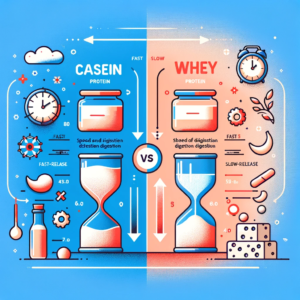Unveiling the Nighttime Secret: Casein Protein’s Role in Your Fitness Journey
Introduction
Protein is the cornerstone of any fitness enthusiast’s diet, fueling muscle repair, growth, and overall body recovery. Amidst the plethora of protein types, casein protein at night stands out for its unique benefits and slow-digesting nature. In this comprehensive guide, we’ll delve deep into the world of casein protein, unraveling why it’s particularly effective when consumed before bed and how it can contribute to your health and fitness goals.
What is Casein Protein?

Casein protein is a rich, slow-releasing protein commonly found in milk and dairy products. It accounts for approximately 80% of the protein content in cow’s milk, with the remaining 20% being whey protein. Casein is unique due to its gradual digestion rate, which provides a sustained release of amino acids into the bloodstream.
This “time-release” feature makes it an ideal protein source for periods of fasting or when the body goes without food for an extended time, such as during sleep. It’s available in various forms, with casein protein powder being a popular choice for its convenience and versatility.
Benefits of Casein Protein at Night
Muscle Recovery and Growth
One of the standout benefits of consuming casein protein at night is its contribution to muscle recovery. During sleep, the body enters a state of repair, where it heals and rebuilds tissues, including muscle fibers damaged during exercise. Casein’s slow absorption ensures a constant supply of amino acids throughout the night, aiding in muscle recovery and reducing the breakdown of muscle tissue.
Furthermore, studies suggest that casein protein can enhance muscle protein synthesis (MPS), a critical process for muscle growth and repair. By providing a steady flow of amino acids, casein supports MPS while you sleep, capitalizing on your body’s natural recovery cycle.
For those looking to maximize their muscle growth, understanding the importance of protein intake is essential. Exploring articles like Protein Intake for Maximum Muscle Growth can provide further insight into how protein fuels muscle development and the role casein specifically plays in this process.
Weight Management
Casein protein’s impact on weight management is twofold. First, its slow digestion rate helps maintain a feeling of fullness, which can curb nighttime cravings and prevent overeating. Secondly, casein’s ability to boost metabolism while preserving lean muscle mass makes it a valuable ally in fat loss efforts.
As muscle tissue burns more calories than fat, even at rest, maintaining and building muscle is vital for a healthy metabolism. By supporting muscle maintenance, casein protein at night can contribute to a more efficient calorie-burning machine – your body.
Improved Sleep Quality
While the jury is still out on whether casein directly influences sleep quality, its indirect effects cannot be overlooked. Consuming a satisfying, protein-rich snack before bed can prevent hunger pangs that might otherwise disrupt sleep. Moreover, the psychological comfort of knowing you’re nourishing your body can also promote a more restful night’s sleep.
Casein vs. Whey: The Nighttime Debate

When it comes to nighttime protein, the casein vs. whey debate often surfaces. Whey protein is known for its rapid digestion and absorption, making it an excellent post-workout choice for quick muscle recovery. However, at night, the slow-releasing nature of casein is more aligned with the body’s reduced metabolic rate and extended fasting period.
By choosing casein over whey before bed, you provide your body with a sustained amino acid supply, preventing muscle catabolism (breakdown) and supporting overnight muscle repair. To gain a deeper understanding of this comparison, consider reading Whey Protein vs. Plant-Based Protein: Maximizing Muscle Growth, which examines the differences between protein types and their specific benefits.
How to Use Casein Protein for Maximum Benefit
Timing Your Intake

To leverage the benefits of casein, timing is crucial. The optimal window for consuming casein protein at night is 30 minutes to an hour before sleep. This allows the protein to begin its slow digestion process as you wind down for the night, ensuring a steady amino acid supply while you sleep.
Dosage
The recommended dosage of casein protein can vary depending on individual goals and body composition. As a general guideline, aim for 20-30 grams of casein before bed. This amount is sufficient to stimulate muscle recovery and provide satiety throughout the night.
Combining with Other Nutrients
For those looking to enhance the effects of casein, consider pairing it with other nutrients. Healthy fats, for example, can further slow the digestion process and provide additional satiety. A small serving of almonds or a tablespoon of peanut butter mixed into your casein shake can make for a perfect pre-bedtime cocktail.
Potential Side Effects and Considerations
While casein is considered safe for most people, there are a few points to consider. Some individuals may experience digestive discomfort due to casein’s slow digestion. Additionally, those with dairy allergies or lactose intolerance should approach casein with caution.
Addressing the concerns around weight gain, it’s essential to understand that casein, like any protein, can contribute to weight gain if consumed in excess of your daily caloric needs. As for sleep disruption, most research indicates that casein does not interfere with sleep and may even support it by preventing hunger-induced wakefulness.
Choosing the Right Casein Protein Supplement
Not all casein supplements are created equal. When selecting a casein protein powder, look for brands that prioritize quality with minimal additives. Avoid products with excessive sugars, artificial sweeteners, or unnecessary fillers. Instead, opt for a clean, micellar casein that provides the purest form of this slow-digesting protein.
Casein Protein Recipes for Nighttime Snacking

To keep your nighttime routine interesting, try incorporating casein into various recipes. Here are a few ideas:
- Casein Pudding: Mix casein powder with a small amount of water or milk to create a thick, pudding-like consistency. Refrigerate for 30 minutes and enjoy a creamy treat.
- Protein-Packed Smoothie: Blend casein powder with almond milk, a frozen banana, and a spoonful of almond butter for a satisfying smoothie.
- Overnight Oats: Stir casein powder into your overnight oats recipe for an extra protein boost in the morning.
Additionally, for those seeking inspiration for muscle recovery shakes, the article Protein Shakes for Muscle Recovery and Growth offers valuable recipes and tips tailored to post-exercise nutrition.
FAQs on Casein Protein at Night
Addressing Common Questions
Let’s tackle some frequently asked questions about casein protein at night:
- Is casein protein good before bed? Yes, due to its slow-releasing nature, casein is an excellent protein source before sleep.
- Does casein burn fat overnight? While casein itself doesn’t burn fat, its role in muscle maintenance can support a healthy metabolism and fat loss.
- Is it better to take egg protein or casein before bed? Casein is generally preferred before bed due to its slower digestion rate compared to egg protein.
- Can casein help me lose weight? When part of a balanced diet and exercise routine, casein can aid in weight management.
Conclusion
Incorporating casein protein at night into your routine can be a game-changer for muscle recovery, weight management, and overall well-being. By understanding how to effectively use this powerful protein, you can unlock its full potential and support your body’s natural overnight healing processes.
For more in-depth information on protein and its effects on the body, consider exploring resources from the National Center for Biotechnology Information (NCBI) and the American Journal of Clinical Nutrition.
Remember, while casein protein is a valuable tool in your fitness arsenal, it should be part of a comprehensive approach to health that includes a balanced diet, regular exercise, and adequate rest.




